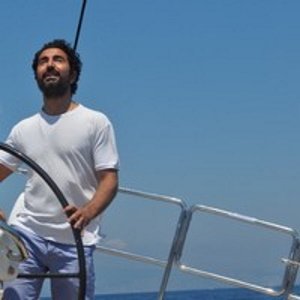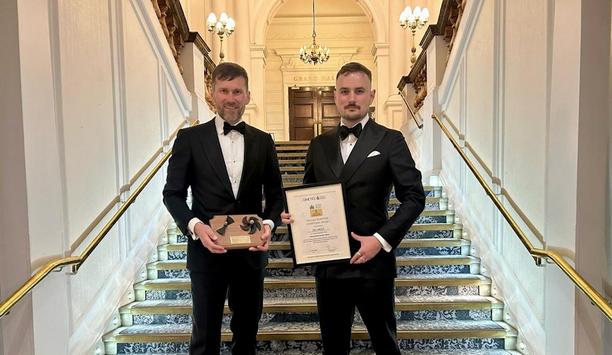The Royal Institution of Naval Architects (RINA) - Experts & Thought Leaders
Latest The Royal Institution of Naval Architects (RINA) news & announcements
SRC Group’s Methanol Superstorage solution has won The Royal Institution of Naval Architects Maritime Innovation Award 2025, recognising its contribution to the adoption of methanol as a mainstream marine fuel. Every year, a panel of RINA judges considers initiatives from academia, as well as industry before giving the prestigious award to the innovation considered the most significant in terms of advancing maritime vessel design, construction, and operations. Methanol superstorage Aligning with International Maritime Organisation targets to reduce greenhouse gas emissions over the coming decades and achieve Net Zero by or around 2050, a ship fuelled by green methanol could reduce carbon emissions by up to 95%. Methanol Superstorage is a unique, space-efficient methanol storage solution However, methanol has significantly lower volumetric energy content than HFO. Owners working with the fuel either need to bunker more frequently or factor in around 2.5 times the fuel storage capacity to produce equivalent energy. Methanol Superstorage is a unique, space-efficient methanol storage solution that will allow existing ships and newbuilds to play a full role in energy transition. Sandwich Plate System technology Conventionally, the tanks used to store low flash-point fuels on ships feature internal and external walls that are separated by cofferdams spanning a minimum of 600mm. Methanol Superstorage meets the storage challenge by replacing this with Sandwich Plate System (SPS) technology, where 25mm thick tank walls are comprised of internal and external steel surfaces connected by an elastomer core. Already approved in principle by Lloyd’s Register and RINA (Registro Italiano Navale), Methanol Superstorage boosts tank capacity on average by around 85% with minimal impact on the GA. CEO’s words Speaking at RINA ’s Annual Dinner, at the De Vere Grand Connaught Rooms, Covent Garden, London on 22 May, Hannes Lilp, CEO and Chair, SRC Group, said: “The SRC team is truly honoured to accept RINA’s Maritime Innovation Award, which considers developments in hydrodynamics and propulsion, structures and materials from across academia and industry.“ Hannes Lilp adds, “Given that our focus in growing SRC over the last 25 years has been on the complex ship project work we do day to day, it is especially rewarding to be recognised for the engineering innovation that has gone into developing Methanol Superstorage.” Rise of alternate fuels DNV’s latest Alternative Fuels Insight (AFI) figures show that ships using methanol accounted for 24 of the 49 orders placed for alternative fuel solution in April 2025. In March, DNV said that 60 methanol-fuelled ships were already in operation, with a further 340 on order. SRC has already undertaken detailed studies covering the use of the Methanol Superstorage solution on board cruise ships, container ships, ferries, tugs, offshore support vessels and yachts.
On 22 May 2025, maritime industry professionals from around the globe will come together at the prestigious De Vere Grand Connaught Rooms, Covent Garden, for the Royal Institution of Naval Architects’ (RINA) flagship Annual Dinner. This highly anticipated event offers an evening of celebration, reflection, and strategic dialogue for naval architects, marine engineers, and maritime innovators. New partnerships and relationships The dinner provides exceptional networking options with senior decision-makers across the maritime sector Beyond its formal programme, the dinner provides unparalleled networking opportunities with senior decision-makers across the maritime sector, making it an ideal setting for fostering new partnerships and strengthening professional relationships. In 2024, the dinner welcomed over 370 guests representing more than 130 companies. The 2025 guest list includes pioneering class societies, consultancies, defence organisations, academic institutions, engineering manufacturers, energy firms, and naval architecture companies, solidifying the dinner as a hub for collaboration across the industry. Future of the maritime industry The evening programme will feature a Presidential address from RINA President Catriona Savage, a celebration of outstanding achievements through industry awards, a networking drinks reception, and a formal dinner - anchored by a compelling keynote address from Commander Mike Forrester MBE, Royal Navy. This year’s awards will recognise excellence across Innovation, Safety, Diversity, STEM, Developing Careers, and other notable achievements shaping the future of the maritime industry. Submarine Family initiative Commander Forrester, this year’s Principal Guest and Speaker, brings over 18 years of service Commander Forrester, this year’s Principal Guest and Speaker, brings over 18 years of service as a Marine Engineer Submariner, having completed operational tours on land and at sea aboard multiple Royal Navy submarines. In 2023, he and a team of fellow submariners took part in the World’s Toughest Row - an unsupported 3,000-mile transatlantic challenge in a 10-metre rowing boat - to raise awareness for submariner mental health and support the Submarine Family initiative. Submariners and their families Reflecting on his participation, Commander Mike Forrester MBE told The Naval Architect: “Being part of the armed forces, we are called to deter threats and defend the nation, but the armed forces are more than just equipment - it’s about people." He adds, "Oardacious started as a challenge among friends, but it’s grown into a platform for fundraising, inclusion and supporting submariners and their families." Royal Navy community RINA is proud to announce HMS Oardacious as the official charity for the 2025 Annual Dinner RINA is proud to announce HMS Oardacious as the official charity for the 2025 Annual Dinner. Since its founding in 2020, HMS Oardacious has raised over £600,000 and continues to champion mental health, heritage, and family support within the Royal Navy community. In January 2025, its all-female team, the Valkyries, completed a landmark Atlantic crossing - further broadening the initiative’s reach and impact. Broadcaster and communications The evening will be hosted by Tom Sharpe OBE, a former Royal Navy Commander turned respected broadcaster and communications consultant. With over 25 years of service and extensive industry insight, Sharpe will bring authority and energy to the event. Tickets are available from £100 + VAT, with a 10% discount available for full table bookings. Availability is limited, and early booking is strongly encouraged.
Eni, an energy company, Fincantieri, a world pioneer in complex shipbuilding, and RINA, a multinational group specialising in engineering consultancy, certification, and inspection, presented the “Sustainable Maritime Transport Outlook” in Rome — in the presence of the Minister for the Environment and Energy Security, Gilberto Pichetto Fratin. The study, focused on the maritime sector, was developed with the technical support of Bain & Company Italy. Net Zero target for 2050 The study aims to contribute to accelerating the decarbonisation of the maritime transport sector The study aims to contribute to accelerating the decarbonisation of the maritime transport sector, in line with the Net Zero target for 2050. It forms part of the broader framework of the agreement signed on March 25, 2024, by Eni, Fincantieri, and RINA, with the shared goal of establishing a global observatory to monitor and assess the medium- to long-term evolution of sustainable decarbonisation solutions for the sector. Carbon neutrality by 2050 The maritime industry is responsible for approximately 3% of global CO2 emissions and is committed to achieving carbon neutrality by 2050. To reach this goal, a clear and realistic roadmap is essential — one that minimises uncertainty and risk for investors while offering practical, economically viable solutions for the entire industry. Cost implications for shipowners Overview of viable decarbonisation options tailored to different vessel segments and regions Addressing this need through a holistic approach, the study provides, for the first time, a global overview of viable decarbonisation options tailored to different vessel segments and regions worldwide. It also integrates volume assessments with a comprehensive analysis of cost implications for shipowners and the investment requirements across the logistics and port infrastructure chain. In the short term, the energy carriers most capable of reducing CO2 emissions include: LNG (liquefied natural gas) – a fossil fuel with lower carbon intensity, though it requires significant infrastructure investments for storage, handling, and bunkering at ports. Biofuels – including HVO, which can be used in its pure form without the need for infrastructure upgrades, and FAME which faces significant limitations when used in pure form. Merchant shipping sector Over the long term, biofuels — including the emergence of Bio-LNG and biomethanol — are expected to remain the primary solution for the merchant shipping sector. Synthetic fuels derived from green hydrogen, along with hydrogen itself, are also likely to gain traction in specific applications — such as low- and medium-power cruise ships — as their competitiveness improves and supply chains continue to develop. Development and implementation of impactful initiatives Synthetic fuels derived from green hydrogen, along with hydrogen itself, are also likely to gain traction Giuseppe Ricci, Chief Operating Officer for Industrial Transformation at Eni, commented: “A year ago, together with Fincantieri and RINA, we committed to developing a global observatory focused on the evolving landscape of sustainable decarbonisation solutions for the maritime sector." "This study — the result of combined expertise, resources, and technologies from key industry players — has produced a clear and actionable framework that can guide the development and implementation of impactful initiatives to decarbonise maritime transport across various segments, while considering the full supply chain." "As also recognised at the EU level, there is growing consensus that biofuels — particularly those already available and usable in their pure form, like HVO — are among the most effective solutions currently available to reduce GHG emissions in the maritime sector.” Sustainable Maritime Transport Outlook Pierroberto Folgiero, Chief Executive Officer and General Manager of Fincantieri, stated: “Decarbonising maritime transport is a challenge that demands industrial vision and the ability to turn innovation into real-world solutions. The Sustainable Maritime Transport Outlook presented today marks a strategic step in that direction — an integrated analysis grounded in real data and scenarios, developed with the support of pioneering players across the sector." "This is also the foundation for our commitment to establish a global observatory, reinforcing our role in driving the transition toward lower environmental impact, while creating value and ensuring competitiveness throughout the entire ship lifecycle. With our Net Zero Ship goal set for 2035, Fincantieri is looking ahead — pioneering the change and integrating technology and sustainability to stay competitive in the long term.” Shipping and transport value chain Carlo Luzzatto, Chief Executive Officer and General Manager of RINA stated: “Knowledge transfer is a key enabler in accelerating the energy transition. Our ability to bring together expertise and experience from different sectors — particularly energy and maritime, where we have a long-standing presence — allows us to develop effective decarbonisation solutions." "Partnerships like this one with Eni and Fincantieri are essential for turning innovation into practical applications, creating value for all players across the shipping and transport value chain.” Future low-emission maritime routes Pierluigi Serlenga, Managing Partner Italy at Bain & Company, added: “Industry stakeholders and investors need a clear vision to guide technological choices and investment strategies. With this first edition of the Observatory, we’ve delivered a valuable tool to help interpret the evolution of the fuel mix in both the short and long term." "Starting around 2040, new solutions will gradually be adopted on specific routes and use cases, complementing biofuels and LNG — although the latter will need to come from bio-based sources. It’s therefore critical to develop a roadmap for upgrading Italy’s port infrastructure to ensure it remains competitive and central to future low-emission maritime routes." "We estimate that by 2050, around €24 billion in investments will be needed across the European port system — a significant share of which represents a real business opportunity for the Italian maritime value chain.” Adoption of new technologies and alternative fuels Maritime sector remains heavily reliant on traditional fuels, which account for 93% of total energy consumption Now, the maritime sector remains heavily reliant on traditional fuels, which account for 93% of total energy consumption. The goal of achieving net-zero emissions by 2050 is driving a major transformation across the industry, with increasing adoption of alternative propulsion sources. In 2023, around 50% of new ship orders were designed for alternative fuels, reflecting a shift toward greater sustainability. Ports are beginning to adapt, developing infrastructure to support a range of new fuel and technology options — but progress remains insufficient. The adoption of new technologies and alternative fuels will depend on a complex mix of factors, including national and regional energy strategies, consumer behaviour, macroeconomic trends, geopolitical developments, supply chain risks, and the pace of technological advancement. Levels of decarbonisation ambition The Outlook presents three future scenarios, each based on varying levels of decarbonisation ambition, technological progress, and availability of fuels and infrastructure. HVO is already available at key ports and offers a degree of cost resilience Projections suggest that decarbonisation will advance more rapidly in the EU and the United States, while fossil fuels and LNG will continue to dominate in the Asia-Pacific region and other parts of the world — making up approximately 70% of the energy mix by 2050. Between 2030 and 2040, Europe and North America are expected to see a major shift from fossil fuels to HVO biofuels — which will serve as the cornerstone of the transition — and to LNG, including its bio-derived form. HVO is already available at key ports and offers a degree of cost resilience, while LNG remains economically competitive in the near term, though it will face increasing regulatory penalties from 2040 onward. Carbon neutrality by 2050 To achieve carbon neutrality by 2050, the industry will also need to explore new alternative fuels, such as synthetic fuels produced from green hydrogen. However, these are not expected to become cost-competitive with fossil fuels until after 2040. Industry need to explore new alternative fuels, such as synthetic fuels produced from green hydrogen In the long term, biofuels derived from renewable feedstocks and synthetic fuels will be essential for decarbonising medium- and long-range merchant vessels. For short-range ships, bioenergy solutions will be sufficient. In the cruise segment, small to mid-sized vessels (luxury and exploration classes) are expected to adopt both HVO biofuels and synthetic fuels, while larger vessels (upper premium and contemporary classes) will rely more heavily on bioenergy sources such as HVO, bio-LNG, and biomethanol. Distribution of alternative fuels Successfully managing this transition will require significant long-term investment in port infrastructure to accommodate the supply and distribution of alternative fuels. Within the European Union alone, investments of up to €24 billion are projected. In terms of infrastructure needs, HVO biofuels and LNG will require relatively limited investment (around 15%), due to their compatibility with existing systems. In contrast, synthetic fuels will demand substantial investment (around 85%), as the necessary infrastructure has yet to be developed.







